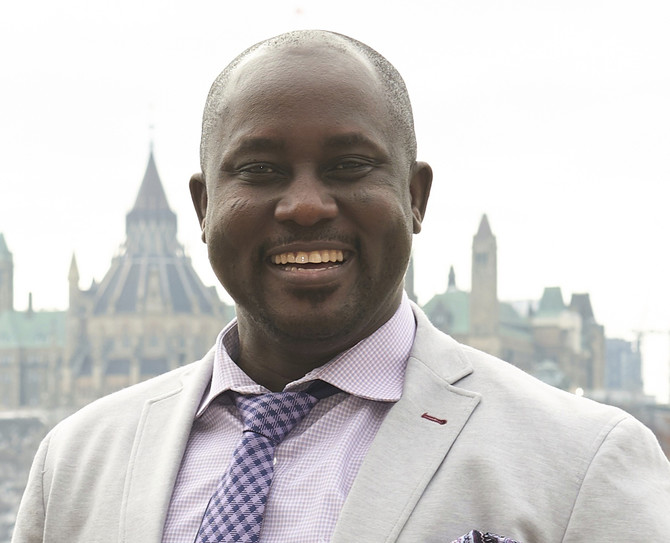ADDIS ABABA: Three Austrian physicians. The co-founder of an international aid organization. A career ambassador. The wife and children of a Slovak legislator. A Nigerian-born Canadian college professor and satirist. They were among the 157 people from 35 countries who died Sunday morning when an Ethiopian Airlines Boeing 737 MAX 8 jetliner crashed shortly after takeoff from Addis Ababa en route to Nairobi, Kenya. Here are some of their stories.
___
Kenya: 32 victims
— Hussein Swaleh, the former secretary general of the Football Kenya Federation, was named as being among the dead by Sofapaka Football Club. He was returning home on the flight after working as the match commissioner in an African Champions League game in Egypt on Friday.
— Cedric Asiavugwa, who studied international business and economic law at Georgetown University in Washington, was on his way to Nairobi after the death of his fiancee's mother, the university said in a statement.
___
Canada: 18 victims
— Pius Adesanmi, a Nigerian professor with Carleton University in Ottawa, was on his way to a meeting of the African Union's Economic, Social and Cultural Council in Nairobi, Nigeria's representative to the panel, John O. Oba, told The Associated Press.

Pius Adesanmi
Adesanmi is the author of "Naija No Dey Carry Last," a collection of satirical essays.
"Pius was a towering figure in African and post-colonial scholarship and his sudden loss is a tragedy," said Benoit-Antoine Bacon, Carleton's president and vice chancellor.
Adesanmi was the winner of the inaugural Penguin Prize for African non-fiction writing in 2010.
—Mohamed Hassan Ali confirmed that he had lost his sister and niece.
Ali said his sister, Amina Ibrahim Odowaa, 33, and her 5-year-old daughter, Sofia Faisal Abdulkadir, were on board the jet. He said his sister lived in Edmonton and was travelling to Kenya to visit with relatives.
— Derick Lwugi, an accountant with the City of Calgary, was also among the victims, his wife, Gladys Kivia, said. He leaves behind three children, aged 17, 19 and 20. Lwugi had been headed to Kenya to visit both of their parents.
___
Ethiopia: 9 victims
— Catholic Relief Services said four of its Ethiopian staff members died. The aid group in a statement says Sara Chalachew, Getnet Alemayehu, Sintayehu Aymeku, and Mulusew Alemu had been traveling to Nairobi for training.
The four had worked with the organization for as long as a decade. They worked in procurement, logistics and finance.
— The aid group Save the Children said an Ethiopian colleague died in the crash.
Tamirat Mulu Demessie was a technical adviser on child protection in emergencies and "worked tirelessly to ensure that vulnerable children are safe during humanitarian crises," the group said in a statement.
___
China: 8 victims
— A statement from the Chinese Embassy in Addis Ababa said the Chinese victims included five men and three women, including one person from the semi-autonomous region of Hong Kong.
Chinese foreign ministry spokesman Lu Kang said two United Nations workers were among the eight Chinese killed. Four were working for a Chinese company and two had travelled to Ethiopia for "private matters."
___
Italy: 8 victims
— Paolo Dieci, one of the founders of the International Committee for the Development of Peoples, was among the dead, the group said on its website.
"The world of international cooperation has lost one of its most brilliant advocates and Italian civil society has lost a precious point of reference," wrote the group, which partners with UNICEF in northern Africa. UNICEF Italia sent a tweet of condolences over Dieci's death, noting that the group was a partner in Kenya, Libya and Algeria.
— Sebastiano Tusa, the Sicilian regional assessor to the Italian Culture Ministry, was en route to Nairobi when the plane crashed, according to Sicilian regional President Nello Musemeci. Tusa was also a noted underwater archaeologist.
— The World Food Program confirmed that two of the Italian victims worked for the Rome-based U.N. agency. A WFP spokeswoman identified the victims as Virginia Chimenti and Maria Pilar Buzzetti.
— Three other Italians worked for the Bergamo-based humanitarian agency, Africa Tremila: Carlo Spini, his wife, Gabriella Viggiani and the treasurer, Matteo Ravasio.
___
United States: 8 victims
___
France: 7 victims
— A group representing members of the African diaspora in Europe is mourning the loss of its co-chairperson and "foremost brother," Karim Saafi. The 38-year-old French-Tunisian was on an official mission representing the African Diaspora Youth Forum in Europe, the group announced on its Facebook page.
"Karim's smile, his charming and generous personality, eternal positivity, and his noble contribution to Youth employment, diaspora engagement and Africa's socio-economic development will never be forgotten," the post read. Saafi left behind a fiancee.
— Sarah Auffret, a French-British national living in Tromsoe, northern Norway, was on the plane, the Association of Arctic Expedition Cruise Operators said. Auffret, a staffer, was on the way to Nairobi to talk about a Cleans Seas project in connection with the U.N. Environment Assembly this week, the company said in a statement.
___
Britain: 7 victims
— Joanna Toole, a 36-year-old from Exmouth, Devon, was heading to Nairobi to attend the United Nations Environment Assembly. Her father, Adrian, described her as a "very soft and loving" woman whose "work was not a job — it was her vocation."
So profoundly sad and lost for words at the loss of our wonderful @FAOfish officer @JoannaToole, who was on her way to represent @faofish at the #UNEA meeting in Nairobi on #ET302. A wonderful human being, who loved her work with a passion. Our love to her family and loved ones pic.twitter.com/6fjE3cNEhI
— Manuel Barange (@Manu_FAO) March 10, 2019
He told the DevonLive website Toole used to keep homing pigeons and pet rats and traveled to the remote Faroe Islands to prevent whaling.
— Joseph Waithaka, 55, lived in Hull, England for a decade before moving back to his native Kenya, also died in the crash, his son told the Hull Daily Mail. Ben Kuria said his father had worked for the Probation Service, adding: "He helped so many people in Hull who had found themselves on the wrong side of the law."
___
Egypt: 6 victims
___
Germany: 5 victims
— The U.N. migration agency said that one of its staffers, German citizen Anne-Katrin Feigl, was en route to a training course in Nairobi.
— Rev. Norman Tendis was a long-time pastor in the protestant congregation of St. Ruprecht in Villach, Austria. The World Council of Churches said Monday that he was traveling to a U.N. environment summit in Nairobi. The 51-year-old is survived by his wife and three children.

Reverend Norman Tendis. (AP)
— The German development aid organization GIZ said one of its staff was also on the plane. GIZ spokeswoman Tanja Stumpff said the woman was on a business trip. She declined to provide further details, citing privacy reasons.
___
India: 4 victims
___
Slovakia: 4 victims
— A lawmaker of the Slovak Parliament said his wife, daughter and son were killed in the crash. Anton Hrnko, a legislator for the ultra-nationalist Slovak National Party, said he was "in deep grief" over the deaths of his wife, Blanka; son, Martin; and daughter, Michala. Their ages weren't immediately available.
Martin Hrnko worked for the Bubo travel agency and was traveling on vacation to Kenya, the agency said.
___
Sweden: 4 victims
— Hospitality company Tamarind Group announced "with immense shock and grief" that its chief executive Jonathan Seex was among the fatalities.
— The Stockholm-based Civil Rights Defenders, an international human rights group, said employee Josefin Ekermann, 30, was on board the plane. Ekermann, who worked to support human rights defenders, was on her way to meet Kenyan partner organizations. The group's executive director, Anders L. Pettersson, says "Josefin was a highly appreciated and respected colleague."
___
Austria: 3 victims
—Austrian Foreign Ministry spokesman Peter Guschelbauer confirmed that three Austrian doctors in their early 30s were on board the flight. The men were on their way to Zanzibar, he said, but he could not confirm the purpose of their trip.
___
Russia: 3 victims
—The Russian Embassy in Ethiopia said airline authorities had identified its deceased citizens as Yekaterina Polyakova, Alexander Polyakov and Sergei Vyalikov.
Russian news reports identified Polyakova and Polyakov as a married couple. State news agency RIA-Novosibirsk said the three were visiting Africa as tourists.
___
Israel: 2 victims
___
Morocco: 2 victims
___
Poland: 2 victims
— Poland's Foreign Ministry says two victims were men and not related to each other. The ministry does not plan to say more about them, citing the need to respect privacy and the interest of the men's families.
___
Spain: 2 victims
___
Belgium: 1 victim
___
Djibouti: 1 victim
___
Indonesia: 1 victim
___
Ireland: 1 victim
— Irishman Michael Ryan was among seven people from the United Nations' World Food Program who were killed.
Clare County Council has opened Books of Condolence for the late Michael Ryan of Lahinch, Co. Clare, at Áras Contae an Chláir in Ennis and at the West Clare Municipal District Office in Ennistymon.https://t.co/0ALmmpkRkP pic.twitter.com/gea4R0Nxt0
— Clare County Council (@ClareCoCo) March 11, 2019
The Rome-based aid worker and engineer known as Mick was thought to be married with two children. His work projects included creating safe conditions for Rohingya refugees in Bangladesh and assessing the damage to rural roads in Nepal that were blocked by landslides.
His mother, Christine Ryan, told broadcaster RTE "he never wanted a 9 to 5 job. He put everything into his work."
Irish premier Leo Varadkar said: "Michael was doing life-changing work in Africa with the World Food Program."
___
Mozambique: 1 victim
___
Nepal: 1 victim
___
Nigeria: 1 victim
—The Nigerian Ministry of Foreign Affairs said it received the news of retired Ambassador Abiodun Oluremi Bashu's death "with great shock."
Bashu was born in Ibadan in 1951 and joined the Nigerian Foreign Service in 1976. He had served in different capacities both at headquarters and abroad, including in Austria, Ivory Coast and Tehran, Iran. He also served as secretary to the Conference of Parties of the United Nations Framework Convention on Climate Change.
At the time of his death, Bashu was on contract with the United Nations Economic Commission of Africa.
___
Norway: 1 victim
—The Red Cross of Norway confirmed that Karoline Aadland, a finance officer, was on the flight. Aadland, 28, was originally from Bergen, Norway. The Red Cross said she was traveling to Nairobi for a meeting.
Aadland's Linkedin page says she had done humanitarian and environmental work. It says her work and studies had taken her to France, Kenya, South Africa and Malawi.

Karoline Aadland
___
Rwanda: 1 victim
___
Saudi Arabia: 1 victim
___
Serbia: 1 victim
Serbia's Foreign Ministry confirmed that a citizen of Serbia was on the plane and gave no details. Serbian media identified him as Djordje Vdovic, 54. The Vecernje Novosti newspaper reported Vdovic worked for the U.N. World Food Program.
___
Somalia: 1 victim
___
Sudan: 1 victim
___
Togo: 1 victim
___
Uganda: 1 victim
___
Yemen: 1 victim
___
U.N. passport: 1 victim
___




























